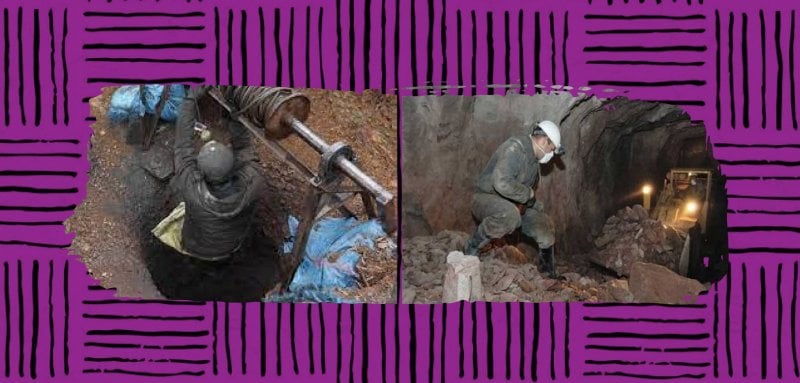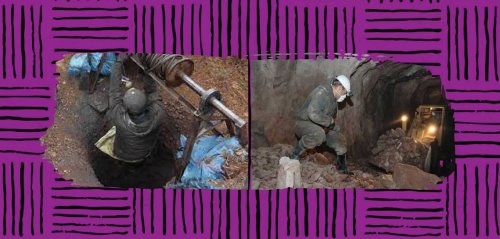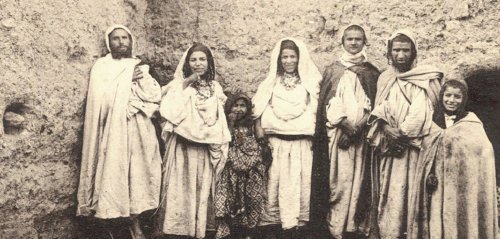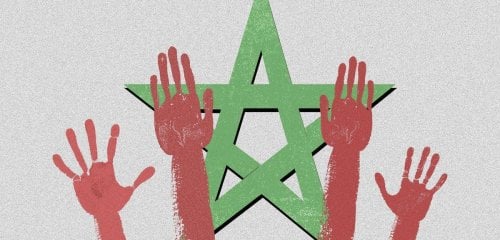History repeats itself once again: once in the form of a tragedy and once in the form of a farce. This is how things are in the mining city of Jerada (east of Morocco). Inside the city, the same tragedies are repeated every year, shedding light once again on the miners who go looking in the dark for some coal to sell and make their living for the day.
The latest in the series of tragedies there saw three miners die from suffocation inside its coal mining wells on the morning of August 16. All attempts to rescue them had failed, adding the three to the list of the martyrs of the ‘black bread’ and the martyrs of the “sandriyat” (random coal wells).
Moroccan authorities said in a statement that the well in which the three died was being exploited by a local legal (mining) cooperative, noting that as soon as it was notified of the incident, it moved to the scene. An investigation into the incident was opened by the relevant authorities under the supervision of the competent public prosecution, but this incident is not the first one of its kind and if the situation remains as it is now, it will not be the last.
The forgotten coal capital
The inhabitants of Jerada live on almost one resource, the coal mines, as this city was decades ago the national capital of coal, especially in the colonial era. The city’s radiance began in 1936, when it became a center and capital for coal, and a destination for job seekers from the countryside and other neighboring areas following the two discoveries that confirmed that it is rich in an underground wealth of coal in 1908, and that were carried out by French geologist Louis Gentil.
Three miners died from suffocation inside its coal wells, and all attempts to rescue them had failed, adding the three to the list of the martyrs of the ‘black bread’ and the martyrs of the “sandriyat” (coal wells)
Because every city has its rise to glory and then its fall, the coal capital began to crumble little by little. In 1998, the Morocco Mills company closed its doors, and soon after, coal mining was retracted and the closure of the company was announced under an agreement between the unions and the government stipulating the preservation of workers’ rights, their compensation, and the creation of alternative jobs for the residents. However, the failure to deliver on these promises following the company’s final withdrawal in 2001 prompted the workers to exploit the mines in rudimentary ways by digging and drilling random mining wells, which would reopen new wounds that try to heal every year in the forgotten coal capital.
The ‘city of black bread’
We went from Oujda, the urban center of the region, to the city of Jerada. The road was full of questions: How do the people of the city make their daily living from coal mines that generate little money? And how is the current state of the city five years after the Jerada (protest) movement, which was sparked by the deaths of two workers within the coal mining wells, which led to widespread protests that reverberated across the country and reached all the Moroccan cities?
The short documentary film “Jerada... Shreds of Life” (‘Bribes de vie’) by Moroccan filmmaker Mehdy Mariouch
When we arrived, the faces of many people, the words of the youth, and the nostalgia for the Jerada movement were all evident, an answer that Raseef22 received about the reality of many in the city, following the successive tragedies of the ‘black bread’.
Hassan (pseudonym), a worker in the illegal coal mining wells, tells Raseef22 about his daily ordeal, which begins each morning with the usual question: “Will I come back to my house in the evening or will I come back being carried in a coffin like what had happened with others?”, he asks in a sad tone. The thirty-something young man who works in the coal mining wells along with some of his relatives goes on to add, “We work in underground mining wells where there are no safety conditions and we sacrifice our lives in exchange for a ‘couple of riyals’ that are not enough to pay bills or even for the daily needs of the family.”
“Will I come back to my house in the evening or will I come back being carried in a coffin like what had happened with others?”
Hassan heads with his group to begin the adventure of descending into a well with a depth of up to 70 meters, using simple and traditional means, without even any necessities or means of survival. Inside the mining wells, there is no sound louder than the sound of “Salawat on the Prophet” (prayers or salutations for the Prophet), along with prayers and pleas asking for God’s mercy to help them safely get out of the well. “After such hard labor and exhausting work, we win some of the time, but lose most of the time, with the profits we sometimes make estimating at one hundred and fifty dirhams (about $15 US dollars), and sometimes less or more. We are not working for money or profit, we are doing this just to try to keep our parents alive.”
Coal wells: A slow death
Not far from the young man, a man whose head had turned gray came across Raseef22. The only things in common between the older man, who had spent more than twenty years in the coal mining wells, and the young man are their matching expressions of despair, the wrinkles on their faces, and a painful reality. He says, “I wake up early in the morning, My wife prepares breakfast and I put some of it in my purse; tea or coffee in a plastic or glass bottle, a loaf of bread, oil, and olives. This is my daily sustenance and that of the people like me who go looking for life inside the coal wells.” The man then goes on to say with great sadness, “Inside the wells of death, the rock can collapse at any moment, one of the workers can suffocate, or a disaster can happen to all of us at the same time, and before we go down only one question remains: Will we return?”
When Hassan leaves the house, his mother stays up waiting for the sound of the key in the lock, which means he had returned home alive, he says, “This is how all the mothers and the wives are (here), as if they are saying, ‘the most beautiful mothers are the ones who waited for their sons, and he returned a martyr’,” Hassan quotes the poem of Lebanese poet Hassan Abdullah, as he is an educated degree holder in postgraduate studies from Mohamed I University in Oujda. But he had found the doors of a proper job closed in his face, and instead the doors of the “wells of death” had opened.
According to what the young man tells us, whether you have a university degree, a scientific degree, or you aren’t educated, your place belongs inside the mining wells in a city that has no industrial facilities and no job opportunities, and even if “you are a child who has just come back, you see yourself undoubtedly inside the coal wells, in a city that lost its glory early, and where the economic alternative is absent. The slogan raised by the residents during the protest movement for providing job opportunities and the many promises that were made to achieve that by the authorities, have gone up in smoke just like our dreams have faded away in the city. There is no economic alternative, no social alternative, and the constant thing here in Jerada is that if we do not die in the ‘sandriyat’, we will die from starvation and misery.”
Hassan graduated from Mohamed I University in Oujda, but he had found the doors of a proper job closed in his face, and instead the doors of the “wells of death” were opened
In popular cafes, near houses, and in some squares, the faces of the people and the passers-by tell the reality of the city that broke out in a popular movement that began in January 2018, following the collapse of the illegal coal wells, after they had become the only alternative for residents to make a living. The movement lasted months, with the people demanding an economic alternative that would restore life back to the city after it had died and provide the minimum for a simple living. Just like Hassan said, “People in Jerada are not demanding big things. We are not even asking for a decent living. What we are looking for is a life that is less dark than one we have. We are just asking for the most basic rights, since a decent living is nothing but a dream that will never come true in Jerada.”
The movement’s demands: gone up in smoke
In a statement, the Moroccan Social Front FSM (a human rights bloc that includes non-governmental human rights and political bodies) denounced the tragedies affecting the city of Jerada, condemning the loss of the lives of young men, and the death of three young men, the latest victims taken by the coal wells. The bloc pointed out that this would not have happened if the government had responded to the demands of the Jerada movement, especially with regard to the economic alternative, and the accountability of those involved in the crimes of looting and corruption.
The FSM noted that the Moroccan authorities “met this popular movement with iron and fire, abused its activists, arrested its leaders, and terrorized and intimidated the residents, all for the mafia that feeds on the sweat of young people who are driven by poverty to risk their lives.”
Jurists and the people of the city who have been involved in the student movement at the University of Mohamed I in Oujda, and the rest of the political frameworks since the outbreak of the first spark of the Jerada movement, unanimously agree that the city has been battered by “exclusionary policies”, as only notables benefit from the wealth of the mines, leaving the most vulnerable and defenseless workers to die at any moment.
Raseef22 is a not for profit entity. Our focus is on quality journalism. Every contribution to the NasRaseef membership goes directly towards journalism production. We stand independent, not accepting corporate sponsorships, sponsored content or political funding.
Support our mission to keep Raseef22 available to all readers by clicking here!
Interested in writing with us? Check our pitch process here!






